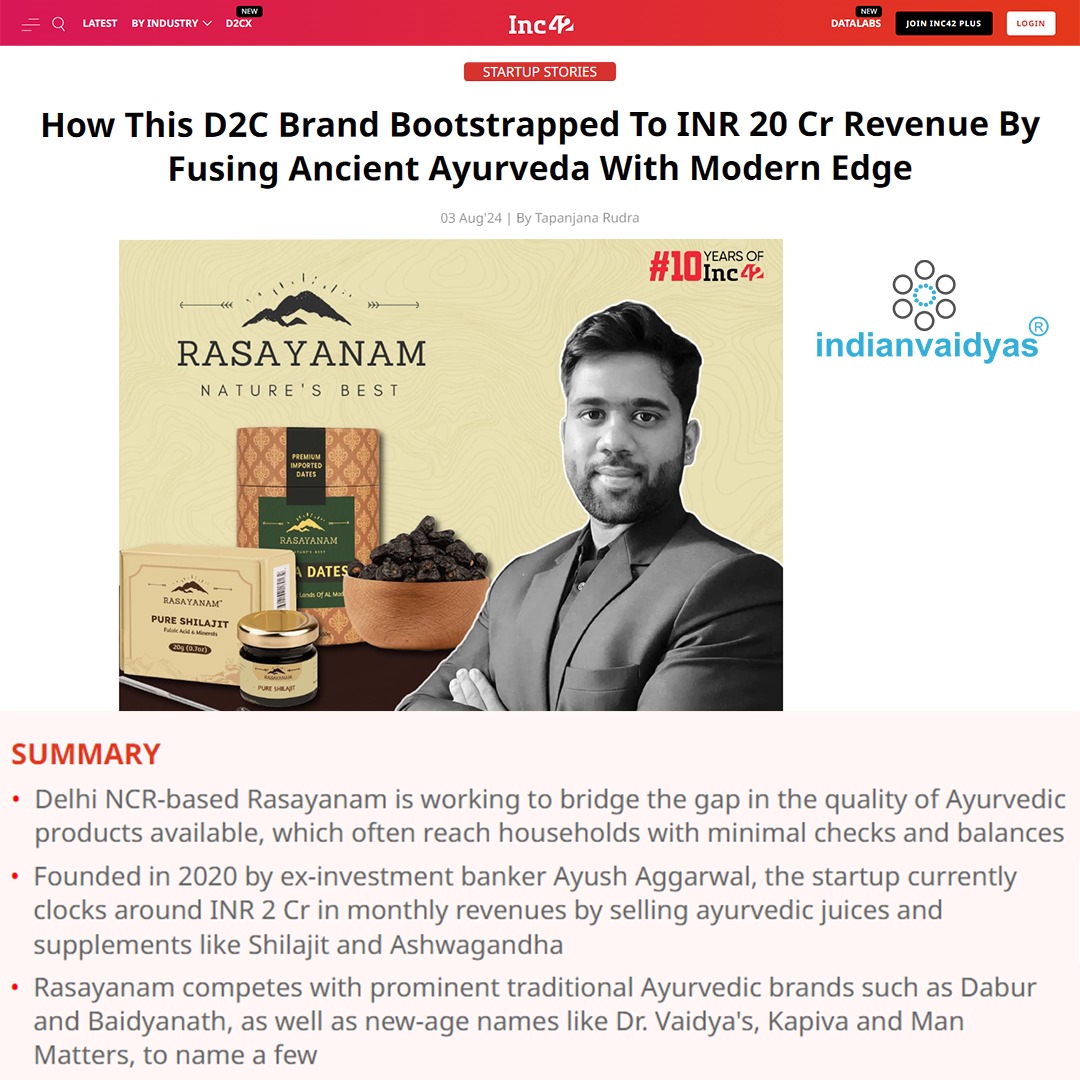How This D2C Brand Bootstrapped To INR 20 Cr Revenue By Fusing Ancient Ayurveda With Modern Edge
05-Aug-24 05:35:36

SUMMARY
- Delhi NCR-based Rasayanam is working to bridge the gap in the quality of Ayurvedic products available, which often reach households with minimal checks and balances
- Founded in 2020 by ex-investment banker Ayush Aggarwal, the startup currently clocks around INR 2 Cr in monthly revenues by selling ayurvedic juices and supplements like Shilajit and Ashwagandha
- Rasayanam competes with prominent traditional Ayurvedic brands such as Dabur and Baidyanath, as well as new-age names like Dr. Vaidya's, Kapiva and Man Matters, to name a few
The world is opening up to the universe of Ayurveda, which has made the pace of the adoption of this ancient science of life and longevity worth noting. It is on the back of this adoption, especially after the pandemic brought the world to its knees, that the homegrown FMCG market has started to witness a huge surge of D2C brands.
Consequently, the market size of Indian ayurvedic products is expected to reach about INR 3.21 Lakh Cr by 2032, growing at a CAGR of 17% from 2024.
However, if we set aside the growth factor, which is largely due to the current fad around Ayurveda, there is a significant gap in the market. This gap pertains to the quality of a horde of Ayurvedic products in circulation, which reach households with minimal checks and balances.
It is precisely this whitespace that Delhi NCR-based Rasayanam is trying to fill in the much-cluttered Indian Ayurvedic space. Committed to disrupting this space with its high-quality, lab-tested Ayurvedic supplements, Rasayanam has become an INR 20 Cr brand in just four years, all while remaining completely bootstrapped.
Per Aggarwal, the startup’s unique selling proposition is its robust mechanisms set in place to maintain high levels of transparency in the market that is currently crying for steep regulations.
All in all, Rasayanam competes with prominent traditional Ayurvedic brands such as Dabur, and Baidyanath, as well as new-age names like Dr. Vaidya’s, Kapiva and Man Matters, to name a few.
The Composition Of Rasayanam
Before incorporating Rasayanam in 2020, Aggarwal was an investment banker in Canada. His growing interest in Ayurveda back then made him quit his handsomely paying job to pursue his interest.
After extensive research, he was surprised to find out that even though there were numerous Ayurvedic brands operating in the land of Ayurveda, India, there were hardly any regulations in place like the US and Canada.
Speaking with Inc42, Aggarwal said Ayurvedic products in foreign countries were more regulated, tested, and of better quality than in India.
That is when the idea to build Rasayanam emerged and Aggarwal started researching on the subject in collaboration with ayurvedic doctors and came up with formulations for its first product, Shilajit.
The D2C startup founder claims to have clocked around INR 20 Cr in revenue in FY24. Currently, Rasayanam boasts a customer base of over 20 Lakh users with its D2C platform comprising 45% of its revenue base. Besides, the startup also sells its ayurvedic products across ecommerce marketplaces like Amazon and Flipkart.
Yet to crack the omnichannel code, Rasayanam is taking baby steps in the offline retail world. Its products are currently available at a few retail channels, including Apollo Pharmacy. The offline channel currently contributes a mere 5% to its total revenues.
Despite mounting expenses, Aggarwal claims to be running a profitable business. He has set his eyes on closing the ongoing fiscal (FY25) with revenues to the tune of INR 35 Cr to INR 40 Cr.
Rasayanam’s Competitive Edge
As mentioned above, for Aggarwal, the lack of transparency around the product quality of ayurvedic products exported from India and sold in the country was a major eye-opener. This was also one of the biggest drives for him to come back to India and start the manufacturing of Ayurvedic products that are of superior quality.
To maintain transparency, Rasayanam allows its customers to fetch detailed test reports of all its products from the company. These reports comprise disclosures like traces of heavy metals, microbial profile, and other content. The test report comes from third-party National Accreditation Board for Testing and Calibration Laboratories (NABL) accredited labs.
Aggarwal claims that Rasayanam’s Ashwagandha has undergone 24 clinical trials, the highest in its category.
Also, Rasayanam, which earns around 3% of its revenue from exports, will be seen scaling its exports, too. Aggarwal said that its products have a significant market opportunity in the Middle East, European countries, and the US. The D2C startup doesn’t want to sell its products via distributors in these countries.
However, for this, the Ayurveda venture will need more investment. Consequently, it is aiming to raise its first external funding in the next few months. The capital will also help the company solidify its domestic footprint, too.
For now, with the country’s D2C market expected to reach $100 Bn by 2025, it would be interesting to witness Rasayanam transition into an INR 100 Cr ayurveda brand while maintaining its profitability quotient.
SOURCE & CREDIT: INC 42